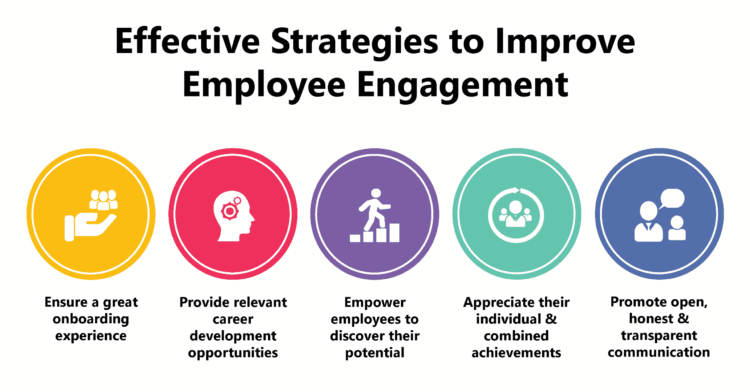1. Flexible Work Environment: Offering flexibility in work schedules and tasks empowers employees, increasing their engagement and commitment to the organization.
2. Timely Recognition of Good Work: Acknowledging and appreciating employees’ efforts fosters a sense of belonging and loyalty, boosting engagement.
3. Opportunities for Development: Providing ample development opportunities through skill-building projects, training, and career discussions enhances engagement by supporting employees’ growth.
4. Honest and Transparent Communication: Building a culture of open communication where employees are heard and informed about decisions affecting them strengthens trust and engagement.
5. Providing a Sense of Purpose: Helping employees understand their role in achieving organizational goals gives them a sense of purpose, motivating them to perform their best.
Boosting employee engagement is especially important in modern work environments, which undergo significant changes. A lack of an engaged workforce can lead to serious productivity and performance issues for most organizations today.

Engaged employees have committed their talent, energy, and time to the growth and profitability of their organizations.
Such employees help their organizations outperform their competitors and help businesses make a faster recovery from market-induced setbacks.

Engaged employees also play critical roles in solving problems, driving innovation, and establishing connectivity between the management and the workforce.
When engaged, employees are more creative and often go above and beyond to ensure the fulfillment of goals.
Despite the benefits of an engaged workforce, more than 70% of employees are either disengaged or indifferent toward their organizations.
Most have to drag themselves to work daily and lack passion while performing their tasks.
It tends to hamper an organization’s productivity, reduce employee motivation, and raise turnover rates.

That is why boosting the engagement level of the workforce has become the top priority for modern organizations.
Here are five simple strategies that organizations can implement to boost employee engagement:
1. Create a flexible work environment
2. Recognize good work without delay
3. Provide ample development opportunities
4. Establish honest and transparent communication
5. Provide a sense of purpose


Most employees feel trapped in a rigid work environment, which makes them feel detached and uninterested in the organization’s growth and success.
An inflexible work environment can lower engagement due to a rigid work schedule or an inability to utilize skills and creativity.
A flexible work environment provides employees with a sense of empowerment and increases their engagement with the organization.

Appreciating employees for good work or desirable behaviors promptly can go a long way in boosting their engagement.
Cheering on employees’ success and highlighting their achievements helps assure them that the organization values them.
It fills them with a sense of belonging and has a profound impact on employee loyalty toward the organization.
This low-cost strategy is considered one of the most effective ways to boost engagement.

Employees are concerned about their professional growth; such development opportunities can boost engagement.
Assigning projects for skill development, understanding individual career aspirations, and appropriate training programs are steps that organizations can take.
Additionally, managers should hold regular career discussions with employees and provide them with the necessary help and support.

Today’s employees do not like to be in the dark and despise the communication policy of “need to know.”
They prefer to work for organizations where honest and transparent communication forms an integral part of the work culture.
Organizations should align employee communication with listening to the views and opinions of employees before making any decisions that impact them.

Helping employees understand their role in organizational growth and success is vital to enhancing their sense of belongingness.
Establishing clear connectivity between employee responsibilities and organization objectives boosts employee productivity by filling them with a sense of purpose.
Employees who feel their work matters tend to give their best and participate in various initiatives.
Implementing the simple strategies above can positively impact employee engagement and create a progressive work environment.
Although these ideas are not exactly new, they require the organization’s commitment and initiative to achieve the desired results.

Lead author: Sagar Chaudhuri, the Co-Founder and CEO of HiFives. He is an HR Tech Evangelist with over 25 years of experience in both corporate and entrepreneurial settings. Previously, Sagar has held leadership roles with companies such as Genpact, Infosys, and ICICI Bank. He has an engineering degree from IIT Kharagpur and an MBA from IIM Lucknow. Connect on LinkedIn
To stay updated on the latest HiFives blogs, follow us on Twitter (@MyHiFives)